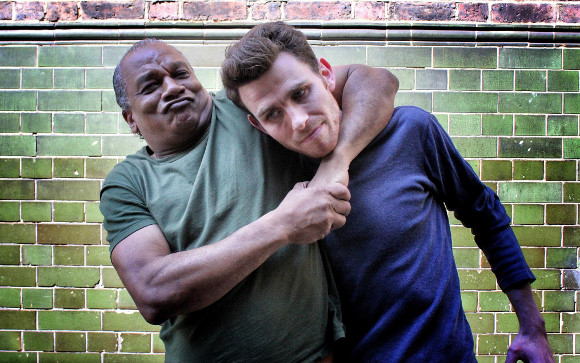In the Jungle of Cities
Bertold Brecht’s 1923 play is revived at the Arcola Theatre by director Peter Stürm

There was a time when early Brecht was regularly seen on the fringe, but this terrific and overdue revival of an exemplary “young man’s play,” a battle for survival in a mythical Chicago of the early 20th century, could not be better timed, with Henry Goodman about to shoot up the West End as Arturo Ui.
In Brecht’s famous plays, you know exactly where you are. The great fascination with Jungle – which could not have a better industrial setting than the brick, steel and wooden construct of the atmospheric new Arcola – is its ambivalent, insidious poeticism, as well as its romantic anti-capitalism and emotional fatalism.
Brecht was high on comic books, crime fiction, Schiller’s tragedies and the French poets – especially Rimbaud’s A Season in Hell – when he proposed, in 1923, a fight to the death between Shlink, a Malayan lumber dealer, and fresh-faced George Garga, newly arrived with his family in the asphalt jungle from the prairies.
Peter Stürm’s vividly acted, excitingly staged production for SpitMoon Theatre reinforces the fight metaphor (and this play was the model for Sam Shepard‘s knock-out rock ‘n roll contest in The Tooth of Crime) with a referee calling the stage directions in eleven rounds.
Shlink (a glowering, reined-in Jeffery Kissoon) challenges Garga (a wonderfully lithe and expressive Joseph Arkley) to take over his business before inveigling himself destructively back into the contest via George’s sister’s affections as the adventure spins out of control and into flophouse disaster. Does real success lead to freedom or madness?
There’s a Marlovian seesaw of power play, but the thicket of the jungle is the ultimate swamp, a bad place of criminals, whores and drunkards; individually driven capitalist adventurism leads inevitably to spiritual bruising. We are all beasts in the forest and life’s a cruel struggle.
It’s pointless to look for psychological truth. Brecht is writing like Goldoni, brilliantly and theatrically on the surface of things. People don’t have motives, they just act, usually badly. The cast understands this, not just the two leads, but also Mia Austen as a sluttish whore and George’s short-lived wife, Rebecca Brewer as George’s sister, Helen Sheals as George’s mother and Michael Walters as an obnoxious pimp.
The 1961 translation by Gerhaud Nellhaus stands up tremendously well – passionate, funny, immediate, and imbued with the distinctive tone of Brecht’s early poems, and it pays off particularly in the final extraordinary scene in the gravel pit by Lake Michigan, Shlink and Garga both out for the count, under the stars, double- (if not triple-) crossed and, for one of them at least, New York calling: “It’s a good thing to be alone. The chaos is used up.”












